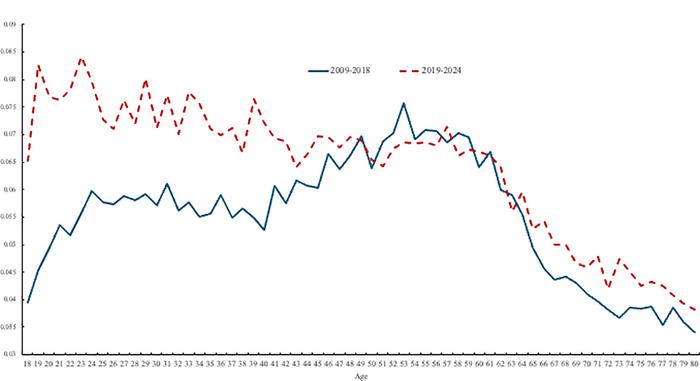While people used to become more worried, stressed, and depressed in middle age, researchers have discovered that may no longer be the case.
The longstanding mental health trend known as the “unhappiness hump” has been observed globally since 2008. The “hump” refers to the upside-down “U” shape that data points make when reflecting that wellbeing tends to decline around the age of 50 before rebounding in later years.
Now, that hump has seemingly disappeared in the U.S. and U.K., according to a new analysis.
Unfortunately, this is likely not because middle aged adults are becoming happier. Instead, Dartmouth College and University College London researchers believe its due to declining mental health in younger people, although the exact reasons for the hump’s disappearance remain unclear.
“Ours is the first paper to show that the decline in young people’s mental health in recent years means that today, both in the United States and the United Kingdom, mental ill-being is highest among the young and declines with age,” they said in a statement. “This is a huge change from the past when mental ill-being peaked in middle-age.”

The analysis revealed that being unhappy now tends to decline over the course of a lifetime in both countries.
However, there were not significant changes observed among people in their late 40s and older individuals.
The decades-long data used for the analysis was taken from mental health surveys conducted by the U.S. Centers for Disease Control and Prevention and the U.K. Household Longitudinal Study.
The data focused on the five years between 2020 and 2025, including the length of the Covid pandemic. Many Americans reported feeling more depressed and anxious as a result of Covid, and mental health in the U.S. has deteriorated in recent years.
From 2011 to 2022, the number of American adults who experienced poor mental health rose significantly, according to Harvard survey in January.

Nearly one in four U.S. adults now report having a mental illness, according to federal health officials.
The mental health challenges posed by the pandemic, underfunded mental health care services, increased social media use, and long-term impacts of the recession were all cited as potential reasons for these findings.
Further research is needed to determine if those reasons are true, and what this all might mean for our understanding of the state of global mental health.
“The reasons for the change are disputed but our concern is that today there is a serious mental health crisis among the young that needs addressing,” the researchers said.




